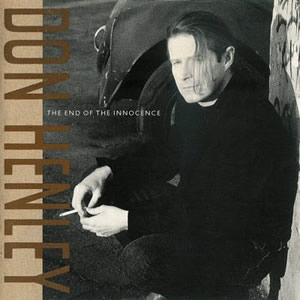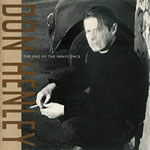The End of the Innocence by Don Henley
 The End of the Innocence was Don Henley‘s best selling solo album and his lone solo release in the 16 year span between 1984 and 2000. A pure pop effort, the album spawned seven singles with six of those reaching the Top Ten of the Mainstream Rock charts and the title song reaching the Top Ten on the Billboard pop chart. The End of the Innocence expands on Henley’s extraordinary talent for composing, which dates back to the The Eagles debut album, and moves firmly into the adult contemporary realm. While the sound of the album has remnants of 1980s slick, Henley’s enlistment of six co-producers, gives The End of the Innocence enough diversity to make it interesting.
The End of the Innocence was Don Henley‘s best selling solo album and his lone solo release in the 16 year span between 1984 and 2000. A pure pop effort, the album spawned seven singles with six of those reaching the Top Ten of the Mainstream Rock charts and the title song reaching the Top Ten on the Billboard pop chart. The End of the Innocence expands on Henley’s extraordinary talent for composing, which dates back to the The Eagles debut album, and moves firmly into the adult contemporary realm. While the sound of the album has remnants of 1980s slick, Henley’s enlistment of six co-producers, gives The End of the Innocence enough diversity to make it interesting.
Taking five years to compose and refine material for a follow-up, Henley relished in the success of his blockbuster 1984 album Building the Perfect Beast. Taking this time also gave him the time to gather some compositional, performance, and production talent for his next effort.
Among his collaborators on the album are Mike Campbell and Stan Lynch of Tom Petty’s Heartbreakers, musical journeyman Bruce Hornsby, and Danny Kortchmar, part of California’s “mellow mafia”, who worked with Jackson Brown, Linda Ronstadt, and Warren Zevon among others. The result is an overall high quality album, albeit uneven. When the songs are good, they are very good, profound, rewarding, and indelible. On the flip side is the cheap eighties filler which, unfortunately, there is quite a bit of between the fine tracks. Still, there is little doubt that Henley was shooting for something big on this album to solidify his legacy in rock, and there is no doubt he achieved that goal.
The End of the Innocence is bookmarked by two of its finest tracks. “The Heart of the Matter” closes and solidifies the album with a perfect tone and tenor and great melody and hook. The wise and mature lyrics about “forgiveness” wash away the bitter taste of some earlier tracks. These lyrics are accompanied by fine musical motifs, from the opening twangy guitar riff through the many rooms of pleasant melody and sonic bliss. “The Heart of the Matter” was co-written by Campbell, and sometimes-Eagles contributor J.D. Souther and reached the Top 20 with significant airplay. The opening title track was co-written by Hornsby and features his deliberate, choppy piano style backing Henley’s melancholy driven melody. This is pure, calm, adult-oriented music with lyrics about the the shattering of childhood simplicity. with low-key yet tremendously effective vocals. “The End of the Innocence” also features an outstanding soprano sax lead by Wayne Shorter which adds to the overall mood of longing for redemption.
The original first side of the album includes a few pure eighties rockers that could be mistaken for cheesy movie soundtracks. After a strong percussion intro, “How Bad Do You Want It” is driven by a sax riff with synth decor and simple rhythms. The straight-forward melody and catchy hook is accompanied by background vocals by many including Sheryl Crow. “I Will Not Go Quietly” has some blues-based guitar riffing but is mainly rock-oriented with simple, hard rock drum beats up front. This song also kind of awkwardly features Axl Rose on backing vocals.
The middle of the album contains a couple more fine tracks. “The Last Worthless Evening” has acoustic with electric overtones reminiscent of Eagles. This stellar – musical mix and production to compliment Henley’s excellent vocals, perhaps his best on the album. The harmonized hook in the bridge brings this song , co-written by John Corey, to the next level. Like a classic movie score with high strings and a club piano out front, “New York Minute” arrives as the album’s most unique and interesting track. The song proper features a fine electric piano by Toto member David Paich along with another great sax solo by Shorter.
The remainder of the album contains songs of lesser quality which have not held up over time. “Shangri-La” starts with a semi-interesting percussive intro before it breaks into a lame attempt at a dance song. “Little Tin God” contains a reggae beat and is a little better than the rest of the filler, due to the great middle high-pitch bend synth solo. “Gimme What You Got” features a pleasant melody and good guitar textures but quickly gets old as it progresses. “If Dirt Were Dollars” has a good bluesy acoustic by Campbell throughout, but the lyrics and delivery are cheap (“as dirt”) as it is trite, preachy, and hard to get through. It is tracks like these that keep The End of the Innocence from being an absolute classic.
Still, the album sold over 6 million copies in the United States alone and won Henley his second Grammy award for Best male Vocalist in 1990. With various Eagles reunions through the 1990s. it would be another 11 years until Henley released his next solo album, Inside Job in 2000.
~
Part of Classic Rock Review’s celebration of 1989 albums.






